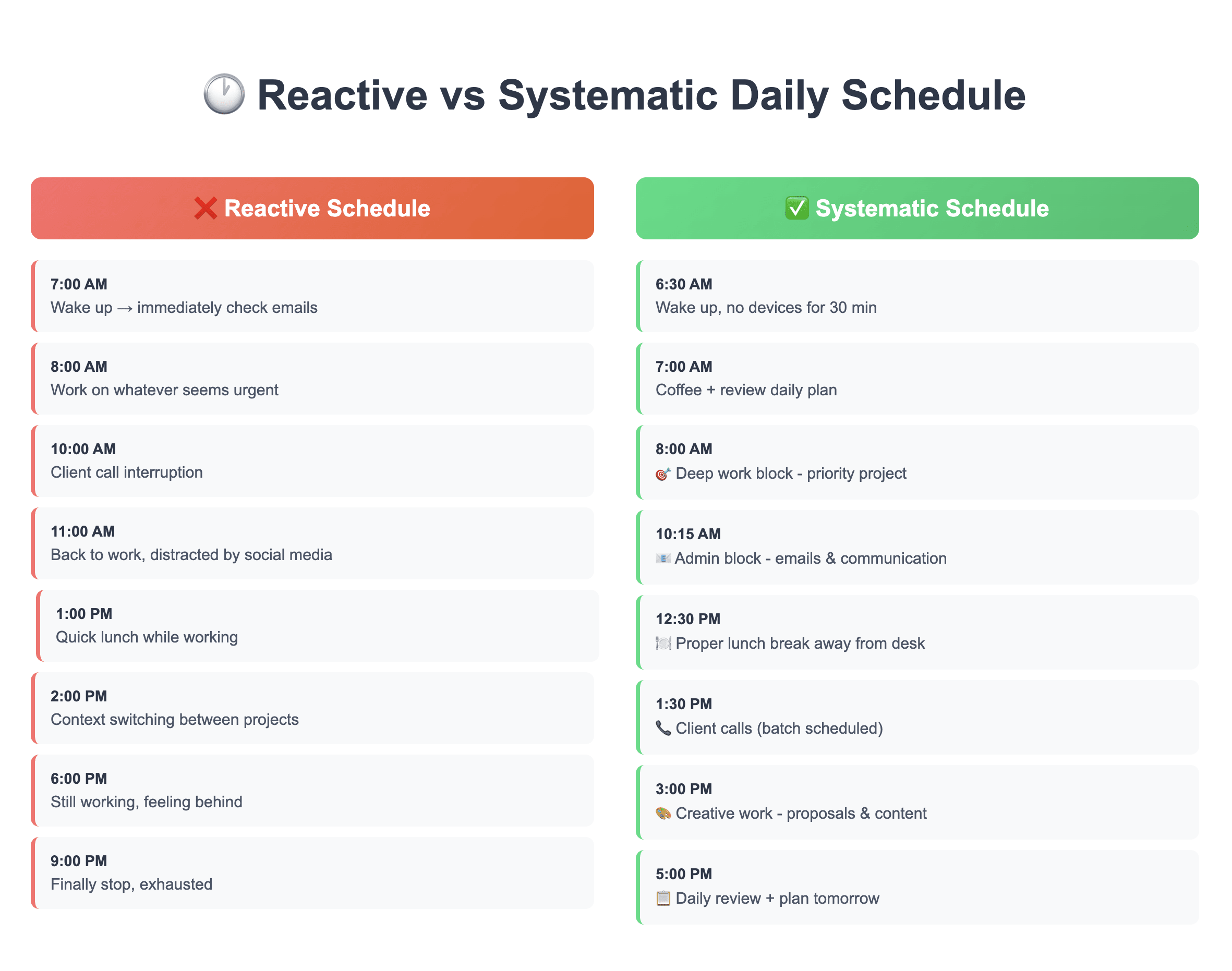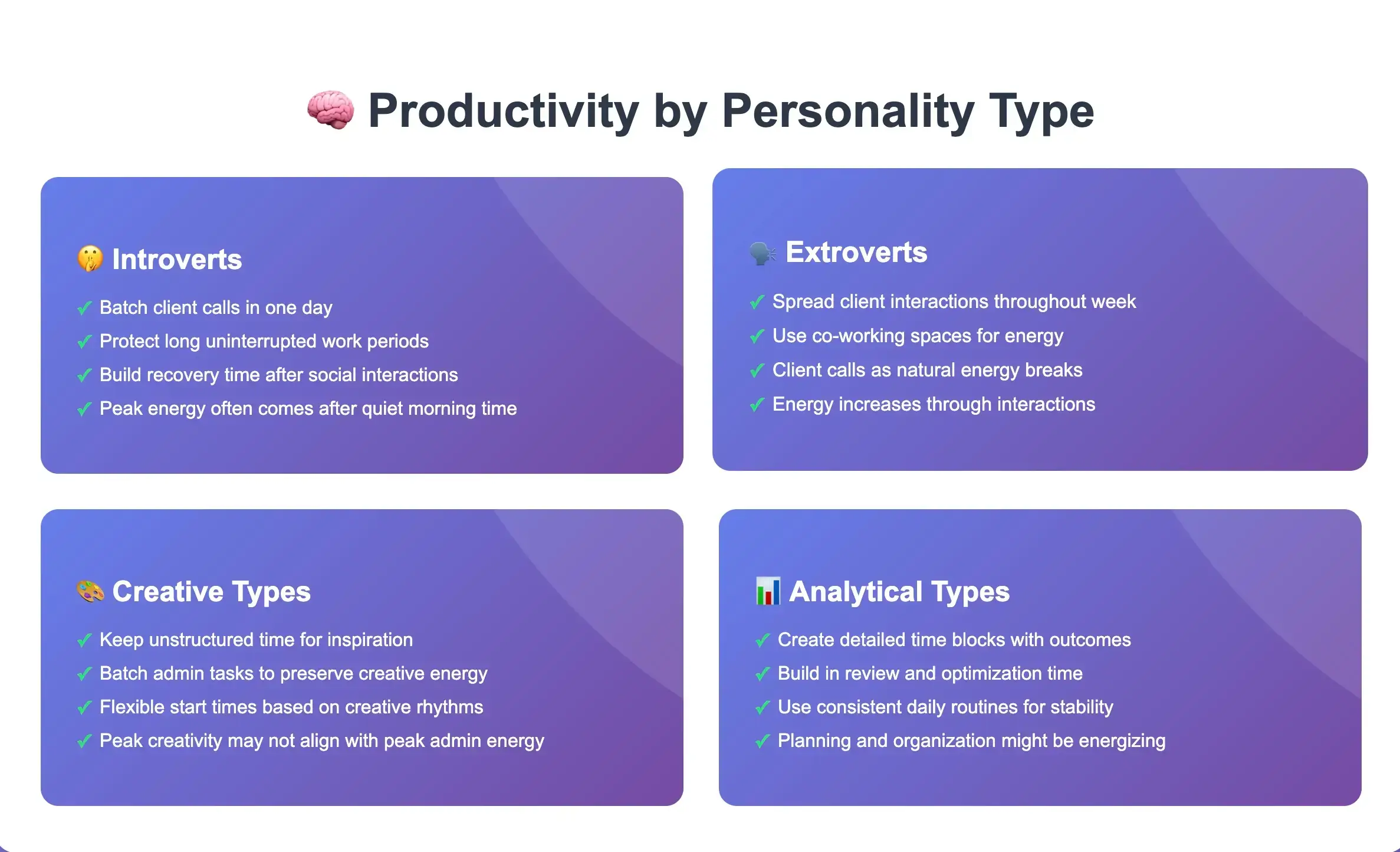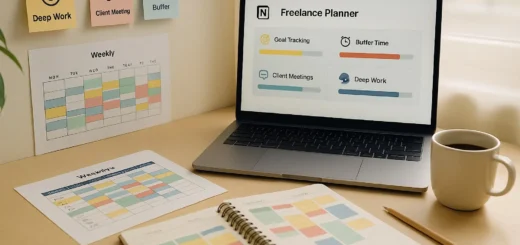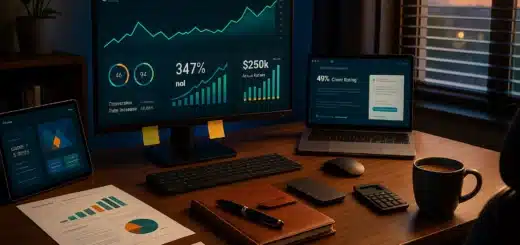The Ultimate Freelance Productivity Guide: Work Smarter, Earn More

Introduction: Freelancing Without Burnou
Seven years ago, I was stuck in survival mode—burning 12 hours a day trying to keep up with clients and chaos. I thought I was doing what successful freelancers do. But I was wrong.
Everything changed when I discovered real, battle-tested freelance productivity tips that helped me systemize my work, protect my energy, and finally scale my income without burning out.
After countless late nights, missed family dinners, and the constant anxiety of juggling multiple clients, I discovered something game-changing: the most successful freelancers aren’t necessarily the busiest ones. They’re the ones who’ve mastered the art of working smarter, not harder.
This guide shares everything I wish someone had told me when I started freelancing, including the most impactful freelance productivity tips I’ve learned through real-world experience. These aren’t theoretical productivity hacks—they’re battle-tested strategies that transformed my freelance business from chaotic survival mode into a profitable, sustainable operation. Read more in our Ultimate Productivity Hub for freelancers.
Whether you’re a beginner or experienced, these freelance productivity tips are designed to help you create a system that works.
If you’re tired of feeling overwhelmed, constantly behind schedule, or watching other freelancers seemingly effortlessly earn more while working less, this guide is for you.
Let’s start with one of the most overlooked freelance productivity tips: understanding how every minute directly impacts your bottom line.
Why Productivity Directly Impacts Your Income
Here’s a reality check that changed my entire approach to freelancing: every inefficient hour costs you real money.
Let me illustrate with a personal example. In my third year of freelancing, I was charging $50/hour for content writing. Due to poor organization and constant task-switching, what should have been 4-hour projects were taking me 6-7 hours to complete. That meant I was effectively earning $28-35/hour instead of $50.
Over a month, this translated to losing approximately $800-1,200 in potential income. Annually? We’re talking about $10,000-15,000 in lost earnings—simply due to inefficient work habits.
The Math of Productivity:
- Scenario A (Inefficient): 8 projects × 7 hours each × $50/hour = $2,800/month
- Scenario B (Optimized): 8 projects × 4 hours each × $50/hour = $1,600/month + 4 extra projects = $4,400/month
Research from Upwork’s Global Freelancing Study consistently shows that top-earning freelancers share one common trait: they’ve systematized their workflow to maximize billable hours while maintaining quality.
The productivity-income connection isn’t just about speed—it’s about:
- Completing more projects in less time
- Having energy for higher-paying, complex work
- Building systems that allow you to scale
- Reducing stress that leads to burnout and client churn
One of the most practical freelance productivity tips is to track actual time spent on tasks—it reveals where you’re losing income.
Also read: How to Create a Highly Efficient Freelance Work Schedule to put these principles into action.
Your Daily Freelance Routine (With Real Schedule Examples)
Freelance Productivity Tips in Action: What I Used to Do vs. What I Do Now

One of the most eye-opening freelance productivity tips I learned was to compare my actual workday against an optimized one. The contrast changed everything.
My Old “Reactive” Schedule:
- 7:00 AM: Wake up, immediately check emails and Slack
- 8:00 AM: Start working on whatever seemed most urgent
- 10:00 AM: Client call interruption
- 11:00 AM: Back to work, but distracted by social media
- 1:00 PM: Realize I haven’t eaten, quick lunch while working
- 2:00 PM: Context switching between 4 different projects
- 6:00 PM: Still working, feeling behind
- 9:00 PM: Finally stop, exhausted and frustrated
My Current “Systematic” Schedule:
- 6:30 AM: Wake up, no devices for first 30 minutes
- 7:00 AM: Coffee + review daily plan (prepared night before)
- 8:00 AM: Deep work block – most important project
- 10:00 AM: 15-minute break + light movement
- 10:15 AM: Admin block – emails, client communication
- 11:00 AM: Project work block – secondary priority
- 12:30 PM: Proper lunch break away from desk
- 1:30 PM: Client calls/meetings (batch scheduled)
- 3:00 PM: Creative work block – new proposals, content creation
- 4:30 PM: Learning/development – skills improvement
- 5:00 PM: Daily review – plan tomorrow, celebrate wins
Energy-Based Work Planning
Not all hours are created equal. One of the most powerful freelance productivity tips is learning how to align your energy peaks with your most demanding tasks. I’ve learned to match my energy levels with appropriate tasks:Not all hours are created equal. I’ve learned to match my energy levels with appropriate tasks:
High Energy (8-11 AM):
- Complex writing projects
- Strategic planning
- Challenging problem-solving
Medium Energy (11 AM-2 PM):
- Client communication
- Research and data gathering
- Routine project work
Low Energy (2-5 PM):
- Administrative tasks
- Social media management
- Learning and skill development
This approach increased my effective working capacity by 40% without adding more hours to my day.
Now let’s explore morning routines that double as powerful freelance productivity tips to prime your day.
Morning Habits That Actually Make a Difference
My morning routine isn’t about perfectionism—it’s built around consistent, high-impact freelance productivity tips that work long-term. Here’s what actually moves the needle:
My 60-Minute Morning System
6:30-7:00 AM: The “No Input” Window
- No phone, no email, no news
- Light stretching or brief walk
- Coffee preparation as a mindful ritual
7:00-7:15 AM: Daily Planning Trigger
- Review yesterday’s wins and challenges
- Identify the day’s “Big 3” priorities
- Time-block the most important tasks
7:15-7:30 AM: Energy Priming
- 5 minutes of focused breathing
- Review weekly and monthly goals
- Set intention for the day’s focus
According to research from “The Power of When” by Dr. Michael Breus, our cognitive performance peaks 1-3 hours after waking. My morning routine ensures I’m mentally prepared to capture this peak performance window.
The Trigger System: I use coffee preparation as my “trigger” for planning. As soon as I start brewing coffee, I automatically pull out my planner. This habit-stacking technique (popularized in “Atomic Habits”) has made daily planning completely automatic.
What Doesn’t Work (From Experience)
- Complex morning routines: 90-minute morning rituals are unsustainable
- Perfectionist approach: Missing one element doesn’t ruin the day
- Copying others: Your routine must fit your lifestyle and energy patterns
Based on that, here are the freelance productivity tips that actually stuck and delivered results for me.
Small Tweaks With Big ROI
After years of trial and error, I’ve identified small changes that create disproportionate improvements in both productivity and income:
From “Do Everything Myself” to Strategic Delegation
Some of the most powerful freelance productivity tips come from shifting mindset and making small operational changes.
Before: I designed my own graphics, managed my own calendar, wrote all my own proposals. After: I hired a VA for $15/hour to handle scheduling and basic design work. ROI: This freed up 8 hours/week for $75/hour client work = $480/week additional income for $120/week investment.
From Reactive Communication to Proactive Batching
Before: Checking email every 15 minutes throughout the day. After: Designated email times at 10 AM, 2 PM, and 5 PM. Result: Eliminated 2-3 hours of daily distractions, improved focus quality.
From Perfectionism to “Good Enough” First Drafts
Before: Spending 3 hours perfecting a single blog post. After: 45-minute first draft, then scheduled revision time. Impact: Doubled my content output while maintaining quality standards.
From Manual Processes to Template Systems
Before: Writing each proposal from scratch (2-3 hours each). After: Modular template system with customizable sections (30 minutes each). Savings: 10+ hours weekly, allowing for 2-3 additional proposals.
One of the most underrated freelance productivity tips is creating reusable templates for recurring tasks like proposals, client onboarding, and reporting.
From Ad-hoc Scheduling to Time Blocking
Before: Working on whatever felt urgent. After: Pre-scheduled blocks for different work types. Result: 35% improvement in deep work quality, reduced decision fatigue.
Level up your systems with courses from top freelancer education platforms.
My 5 Must-Have Productivity Tools (Real Usage)
These aren’t affiliate recommendations—these are tools I actually use daily and would immediately repurchase if lost:
Explore our full Freelancer’s Toolkit for more productivity-enhancing apps and AI tools.
1. Toggl Track (Time Management)
What it does: Tracks time across projects and clients How I use it:
- Automatically tracks billable hours
- Reveals time-wasting patterns
- Provides accurate project estimates
Real Impact: Discovered I was underestimating projects by 25%, leading to immediate rate adjustments that increased monthly income by $1,800.
2. Notion (Project Management)
What it does: All-in-one workspace for notes, tasks, and databases How I use it:
- Client relationship database
- Project templates and workflows
- Weekly review and planning system
Before vs. After: Reduced project setup time from 45 minutes to 8 minutes using templates.
3. Calendly (Scheduling)
What it does: Automated scheduling for client calls and consultations How I use it:
- Buffer time before/after calls
- Different meeting types for different services
- Automatic timezone conversion
Time Saved: 3-4 hours weekly on scheduling back-and-forth emails.
4. Grammarly (Quality Control)
What it does: Advanced grammar and style checking Why it’s essential:
- Maintains professional quality across all communication
- Catches errors I miss during rushed writing
- Builds client confidence in my attention to detail
5. RescueTime (Energy Management)
What it does: Tracks computer usage and provides productivity insights How it helps:
- Identifies my peak focus hours
- Reveals productivity drains
- Provides weekly efficiency reports
Key Insight: Discovered my productivity drops 40% after 3 PM, leading to schedule restructuring that improved daily output.
Read more in How AI Will Transform Freelancing and what it means for productivity.
How I Beat Procrastination (And Still Occasionally Struggle)
For more tactics, check out How to Stop Freelancer Procrastination & Stay Motivated.
One of the most common requests I get is for freelance productivity tips that fight procrastination effectively.
Let’s be honest: procrastination isn’t a problem you solve once and forget about. It’s an ongoing challenge that requires ongoing solutions.
My Procrastination Triggers (Yours May Differ)
- Overwhelming project scope: When I can’t see the finish line
- Perfectionist paralysis: When “good enough” feels impossible
- Energy mismatches: Forcing creative work during low-energy periods
- Unclear expectations: When project requirements are vague
Techniques That Actually Work
The 15-Minute Rule: When facing a dreaded task, I commit to just 15 minutes. Usually, starting is the hardest part, and I end up working longer. If not, at least I’ve made progress.
Task Batching: Instead of switching between writing, research, and admin tasks, I batch similar activities:
- Monday: Content creation and writing
- Tuesday: Client communication and project management
- Wednesday: Research and strategy development
- Thursday: Administrative tasks and invoicing
- Friday: Learning and business development
The “Minimum Viable Progress” Approach: Rather than aiming for perfection, I define the smallest possible progress:
- Write one paragraph instead of a complete article
- Send one follow-up email instead of updating entire client database
- Research one competitor instead of comprehensive market analysis
Visual Priority Systems:
I use a simple Kanban board in Notion with four columns:
- Must Do Today: Maximum 3 items
- Should Do This Week: 5-7 items
- Could Do Soon: Future tasks and ideas
- Waiting On: Items blocked by external factors
When I Still Struggle
Even with systems, I sometimes procrastinate. When this happens, I:
- Acknowledge it without judgment: “I’m procrastinating right now”
- Identify the underlying cause: Usually fear, overwhelm, or energy mismatch
- Choose the smallest possible action: Often just opening the relevant document
- Adjust the approach: Maybe the task needs to be broken down further
Energy Management Over Time Management
This was my biggest breakthrough: realizing that managing energy is more important than managing time.
The Energy Discovery
Three years into freelancing, I noticed a pattern. My morning writing was sharp, creative, and flowed easily. My afternoon writing felt forced, required multiple revisions, and often missed the mark. Same skill, same experience, same client—but completely different energy levels.
This led me to track my energy patterns for 30 days using both RescueTime data and manual energy ratings (1-10 scale) every two hours.
Also read: Avoid Freelancer Burnout for more on sustainable energy and focus.
Finding Your Personal Energy Pattern
Important note: Your energy map will likely differ from mine based on your personality type:

For Introverts:
- Peak energy often comes after quiet morning time
- May need longer recovery periods between client calls
- Deep work typically better in solitude
For Extroverts:
- May find energy increases through client interactions
- Brainstorming calls might energize rather than drain
- May prefer collaborative work during peak hours
For Creative Types:
- Peak creativity might not align with peak administrative energy
- May need flexibility for inspiration-driven work
- Could benefit from creative blocks vs. structured blocks
For Analytical/Structured Types:
- May prefer consistent daily routines
- Peak energy often aligns with logical, systematic tasks
- Planning and organization might be energizing rather than draining
My Personal Energy Map
Peak Energy (7-11 AM):
- Complex writing projects
- Strategic planning
- Difficult client conversations
Moderate Energy (11 AM-2 PM):
- Client communication
- Routine project work
- Research and data gathering
Low Energy (2-5 PM):
- Administrative tasks
- Learning and skill development
- Planning and organizing
How to Discover Your Pattern
Week 1: Track your energy levels every 2 hours (1-10 scale) Week 2: Match your highest-value work to your highest-energy periods Week 3: Protect your peak energy times and evaluate results
The 60% Rule
Don’t schedule more than 60% of your peak energy time with predetermined tasks. This leaves room for unexpected opportunities and energy fluctuations.
Learn how to invest that time in diverse income streams for sustainable growth.
The Mindset Shift That Changed Everything
Behind every productivity system are key beliefs—some of the most powerful freelance productivity tips come from mindset, not mechanics.
The transformation from struggling freelancer to systematically successful one didn’t happen because I learned new tools or techniques. It happened because of a fundamental mindset shift.
From “I Need to Work Harder” to “I Need to Work Systematically”
Old Mindset: “Successful freelancers work more hours and take on more projects.” New Mindset: “Successful freelancers build systems that make every hour more valuable.”
This shift happened during a particularly difficult month when I was working 60+ hours but barely meeting expenses. I realized that my most successful freelance friend wasn’t working more than me—she was working differently.
The Identity Change
Instead of thinking “I’m a freelancer who needs to be more productive,” I started thinking “I’m a systematically productive professional who happens to freelance.”
This changed everything:
- I stopped apologizing for boundaries around my schedule
- I began investing in tools and systems like a business owner
- I started saying no to projects that didn’t align with my optimal working style
- I focused on becoming known for reliability and quality, not just availability
The Systems-First Approach
Old approach: React to problems as they arise New approach: Build systems that prevent problems
Examples of systems thinking:
- Client onboarding: Standardized process from first contact to project completion
- Quality control: Checklists and templates that ensure consistency
- Communication: Predetermined response times and update schedules
- Pricing: Clear formulas based on project complexity, timeline, and value
When Productivity Became Identity
The real breakthrough came when being productive stopped being something I had to remember to do and became part of who I am. This happened through:
Consistent daily practices: Small actions that reinforced the identity Environmental design: Workspace and tools that supported productive behavior Social reinforcement: Connecting with other systematically productive freelancers Celebrating systems wins: Acknowledging when systems prevented problems, not just when they solved them.
Once your systems are running, learn to scale in our Step-by-step $10K/Month Guide.
Lessons from 7+ Years Freelancing
Top 5 Productivity Myths I No Longer Believe
Myth 1: “Successful freelancers work all the time” Reality: Successful freelancers work intentionally and protect their non-work time fiercely.
Myth 2: “You need to respond to clients immediately” Reality: Setting clear communication expectations actually increases client respect and reduces urgent requests.
Myth 3: “Productivity means doing more tasks” Reality: Productivity means doing the right tasks efficiently and saying no to everything else.
Myth 4: “You need the latest productivity apps and tools” Reality: Simple, consistently used systems beat complex, sporadically used ones every time.
Myth 5: “Productive people don’t struggle with motivation” Reality: Productive people have better systems for working despite low motivation, not higher baseline motivation.
What I Wish I Knew When Starting
Start with systems, not hustle. My first three years were characterized by working harder rather than smarter. If I could go back, I’d focus on building sustainable systems from day one. It’s one of those freelance productivity tips that would have saved me hundreds of wasted hours early on.
Your energy patterns matter more than time management techniques. All the Pomodoro timers in the world won’t help if you’re trying to do creative work during your natural low-energy periods. Understanding your own rhythms is a foundational freelance productivity tip many overlook.
Boundaries create opportunities. Every “no” to a misaligned project or unreasonable client request creates space for better opportunities. Saying no is often the most overlooked of all freelance productivity tips, but it’s essential for long-term sustainability.
Investment in productivity pays compound returns. The $200 I spent on proper project management software seemed expensive at the time but has saved thousands of dollars in time and prevented countless client relationship issues. Sometimes, the best freelance productivity tips involve strategic spending—not just saving time, but multiplying income.
My Top Advice for New Freelancers
Start with this one thing: Track how you actually spend your time for one week. Not how you think you spend it—how you actually spend it. This data will be more valuable than any productivity book or course.
Use a simple tool like Toggl or even a notebook. Track:
- Actual work time vs. time spent “being available”
- Which tasks take longer than expected
- When you do your best work
- What consistently interrupts your focus
Then: Design your ideal day based on this data, not on what you think you “should” do.
Not all freelance productivity tips require long-term effort—here are three that give results this week.
Quick Wins: 3 Immediate Freelancer Productivity Hacks
These are micro-changes you can implement immediately that create noticeable improvements:
1. The “Top 3” Night-Before Planning (5 minutes)
Before ending each workday, write down tomorrow’s three most important tasks. This eliminates morning decision fatigue and creates immediate focus.
Why it works differently for different types:
- Structured personalities: Love the clarity and control
- Creative types: Frees mental space for inspiration by removing decision-making
- Anxious freelancers: Reduces morning overwhelm and provides direction
2. Email Signature Automation (5 minutes)
Create email signatures that include:
- Your typical response time (“I typically respond within 24 hours”)
- Link to your calendar for easy scheduling
- Links to frequently requested information
Impact: Reduces back-and-forth emails by 30-40%.
3. The One-Hour Focus Block (5 minutes to set up)
Choose one hour daily where you:
- Turn off all notifications
- Close all browser tabs except work-related ones
- Work on your most important task
Adaptation by personality:
- Introverts: May prefer longer blocks (2-3 hours) with complete isolation
- Extroverts: Might need shorter blocks (30-45 minutes) with social breaks
- Creative types: Could use this for ideation rather than execution
- Analytical types: Perfect for data-heavy or strategic work
Start small: Even 30 minutes of protected focus time will feel transformative.
Productivity Tools Comparison
| Tool Category | Basic Option | Premium Option | Best For |
|---|---|---|---|
| Time Tracking | Toggl Track (Free) | RescueTime Premium ($12/mo) | Understanding work patterns |
| Project Management | Trello (Free) | Notion Pro ($8/mo) | Complex project workflows |
| Communication | Gmail + Templates | Front ($19/mo) | Client relationship management |
| Scheduling | Google Calendar | Calendly Premium ($8/mo) | Professional client booking |
| Focus | Forest App ($4 one-time) | Freedom ($8.99/mo) | Blocking distractions |
Common Productivity Challenges and Solutions
Challenge: Inconsistent Income Affecting Focus
Solution: Create a “minimum viable month” budget and build an emergency fund equal to 3 months of this amount. Financial stress is productivity poison.
Challenge: Client Scope Creep Disrupting Schedules
Solution: Build revision limits and scope definitions into every contract. Use project management tools that make scope expansion visible.
Challenge: Feeling Guilty During Non-Work Hours
Solution: Track the correlation between rest time and work quality. Most freelancers discover that proper rest actually improves their hourly rate.
Challenge: Difficulty Saying No to Projects
Solution: Create a “project scoring system” with objective criteria. Score each opportunity and only accept projects above your threshold.
FAQ: Freelance Productivity
How long does it take to see results from productivity systems?
Most freelancers notice immediate improvements in stress levels and focus within the first week. Measurable improvements in income and work quality typically appear within 30-60 days of consistent system implementation.
The key is starting small and building consistency rather than trying to implement everything at once.
What’s the biggest productivity mistake freelancers make?
Trying to copy someone else’s system wholesale instead of adapting it to their own energy patterns, work style, and client needs. The most productive freelancers customize their approach based on personal data and preferences.
How do I maintain productivity systems during busy periods?
Build “minimal viable versions” of your systems for crisis periods. For example:
- Normal planning: 30-minute weekly review + daily planning
- Crisis planning: 5-minute daily “Big 3” identification
- Normal communication: Detailed project updates
- Crisis communication: Simple status templates
Should I use multiple productivity tools or stick to one?
Start with one tool per category (time tracking, project management, communication) and only add new tools when you’ve identified a specific gap that your current tools can’t fill. Tool switching is one of the biggest productivity killers.
How do I handle clients who expect immediate responses?
Set clear communication expectations upfront:
- Include response time commitments in your contracts
- Use email signatures that reinforce these expectations
- Explain how focused work time leads to better results for them
- Offer priority communication options for urgent situations (usually at premium rates)
Conclusion: Progress Beats Perfection
After seven years of freelancing and countless productivity experiments, here’s what I know for certain: the perfect productivity system doesn’t exist. What exists is the system that works for you, in your current situation, with your current clients and constraints.
The freelancers who thrive aren’t the ones with the most sophisticated systems—they’re the ones who consistently use simple, effective systems and continuously refine them based on real results.
Your next step: choose one of the freelance productivity tips from this guide and implement it this week. Not five strategies, not a full system overhaul—just one change that feels realistic and valuable to you right now.
Track your results for two weeks. Did your focus improve? Did your workflow feel smoother? Use that insight to decide whether to refine, expand, or try another approach.
Freelance productivity tips aren’t just clever hacks—they’re the building blocks of long-term success. Every small, systematic improvement compounds over time. The real difference between a struggling freelancer and one earning consistent income isn’t talent or luck—it’s how consistently they apply systems that work. Not harder work, but smarter execution.
Ready to Transform Your Freelance Productivity?
Join over 2,500+ freelancers in our FreelanceBoosters Telegram channel where we share:
- Weekly productivity experiments and results
- Tool recommendations based on real usage
- Client management strategies that work
- Income optimization techniques
Before you leave, explore The Most Profitable Freelancing Niches in 2025



